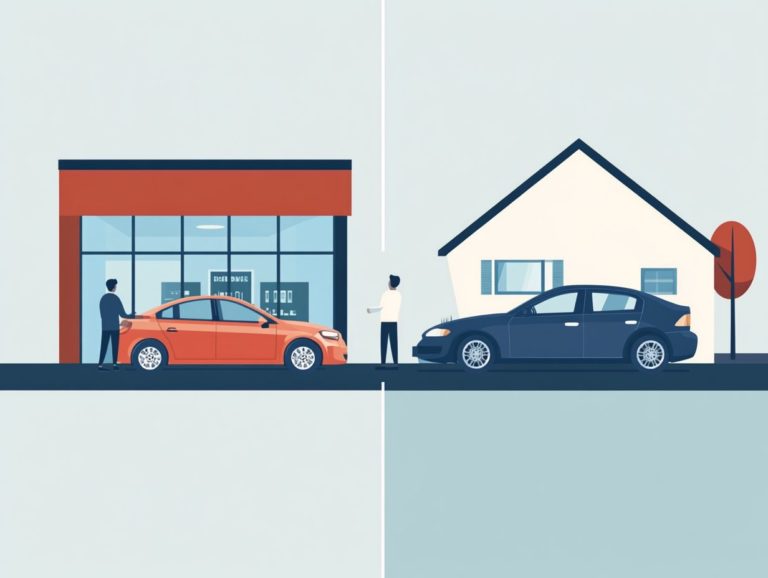How to Analyze a Car’s Resale Value
When you’re considering buying or selling a car, grasping its resale value is essential. This article offers valuable insights into what resale value means and why it matters, particularly for informed financial decisions.
You ll delve into the key factors that impact a vehicle’s resale value. These include age, mileage, brand popularity, and market trends.
Discover practical tips to assess and enhance this value, ensuring you maximize your investment.
Whether you’re a seasoned car owner or stepping into the market for the first time, this guide will equip you with the knowledge you need to navigate the resale landscape effectively.
Contents
- Key Takeaways:
- Understanding Resale Value
- Factors that Affect Resale Value
- How to Determine a Car’s Resale Value
- Tips for Increasing Resale Value
- Frequently Asked Questions
- What factors should I consider when analyzing a car’s resale value?
- How can I determine the current market value of a used car?
- Does the color of a car affect its resale value?
- Is it better to sell my car privately or trade it in at a dealership?
- Can I improve my car’s resale value?
- Why is it important to analyze a car’s resale value?
Key Takeaways:

- Understanding resale value and its significance when buying or selling a car is crucial.
- Factors such as age, mileage, brand, and market demand can greatly impact a car’s resale value.
- To determine a car’s resale value, conducting research and utilizing online tools can be helpful.
Understanding Resale Value
Understanding resale value is essential for buying or selling in the automotive market. It plays a significant role in decisions during private-party sales, trade-ins, and vehicle appraisals.
Factors like depreciation, the condition of the vehicle, and the overall demand for used cars shape this resale value. Resources like Kelley Blue Book and Black Book provide insights into fair purchase prices and the actual cash value of vehicles.
By gathering information about your car, such as mileage and condition, you can make informed decisions that enhance your financial outcomes.
What is Resale Value and Why is it Important?
Resale value represents the estimated worth a vehicle retains when sold after its initial purchase. Grasping this concept is crucial for you as both a buyer and a seller in the automotive market.
This figure influences negotiation outcomes and your overall financial decisions regarding vehicle ownership. Being aware of the anticipated resale value can greatly impact the viability and profitability of any transaction.
Several factors contribute to this value, including the car s age, mileage, and overall condition, along with prevailing market trends. Vehicles lose value over time, and it’s crucial to consider this when evaluating potential returns.
Understanding these elements is vital to making informed choices during a sale.
Factors that Affect Resale Value
Several key factors significantly influence the resale value of your vehicle. Consider its age, mileage, condition, and overall market demand; these elements are pivotal in shaping its worth.
The popularity of the brand and model, along with specific features such as automatic transmission or leather seats, can impact how much you can expect to receive in the used-car market.
Vehicle Age and Mileage
Vehicle age and mileage are critical factors influencing your car’s resale value, as they directly affect depreciation and perceived condition in the marketplace.
As your vehicle ages, you ll likely notice a decline in its market value due to wear and tear. For example, a car that is five years old might have lost around 60% of its original value, depending on its make and model.
Regarding mileage, the general rule of thumb is that every 1,000 miles driven can reduce the vehicle’s value by about $0.10. A car with high mileage often suggests a shorter lifespan ahead, further accelerating depreciation.
Appraisers consider these elements, along with historical sales data and market trends, to determine a vehicle s worth, which can significantly affect your resale opportunities. For instance, a low-mileage car that is just three years old may retain its value much better, making it far more appealing to potential buyers.
Now that you’re equipped with this knowledge, start evaluating your car’s resale value today!
Brand and Model Popularity

Brand and model popularity is important in deciding a vehicle’s resale value. Cars from trusted manufacturers like Toyota, Honda, and Subaru usually keep their value better than others.
This is due to consumer trust, perceived quality, and performance history. When evaluating options, consider these brands’ reputations for reliability and longevity.
Car enthusiasts often pay more for used models with sought-after features. Current market trends show that demand can fluctuate based on fuel efficiency, safety ratings, and tech advancements.
The resale landscape is shaped by brand loyalty and the changing preferences of consumers like you.
Condition and Maintenance History
The condition of your vehicle and its maintenance history are crucial for resale value. A well-maintained car with full records attracts more buyers.
When you check a pre-owned car, look for factors like accidents, repairs, and maintenance frequency. A complete service history shows reliability and highlights the owner’s commitment to care.
Cars with timely inspections stand out in the market for their safety and performance. Don’t underestimate the impact of these details; a good maintenance record can boost a vehicle s appeal.
Market Demand and Trends
Market demand and trends greatly affect resale values. Changes in consumer behavior can cause used-car prices to vary.
Understanding these dynamics gives you valuable insights as a buyer and a seller. For instance, the rising popularity of SUVs has increased their resale values, making them a hot choice.
In contrast, traditional sedans are losing appeal as preferences shift. The rise of electric cars is also creating a new market as sustainability becomes a priority.
Stay updated on current trends to make smart choices when buying or selling vehicles.
How to Determine a Car’s Resale Value
To find a car’s resale value, analyze several factors. Additionally, you can refer to resources on how to evaluate new car resale value for more valuable insights, as well as using reputable appraisal tools like Kelley Blue Book and Edmunds.
Researching Similar Vehicles
Researching similar vehicles is key in finding resale value. This step helps you assess market conditions and price your car competitively.
Utilize trusted resources like Kelley Blue Book and Edmunds for insights on comparable models, including features, mileage, and condition.
Carefully compare these aspects to ensure you set a fair price. This approach positions your vehicle well against others and boosts your confidence during negotiations.
Using Online Tools and Resources

Online tools like Kelley Blue Book and Edmunds enhance your ability to assess a vehicle’s resale value. These platforms provide appraisals that help you compare your car’s details like make, model, year, and condition with current market trends.
For example, when evaluating a used sedan, you can access historical price data and regional variations. This provides you with a well-rounded understanding of its worth. Many of these tools also deliver vehicle history reports, revealing crucial information such as accident records and previous ownership. By cross-referencing this data, you can negotiate a fair trade-in value or purchase price, giving you the power to make informed decisions in an often complex marketplace.
Tips for Increasing Resale Value
To elevate the resale value of your vehicle, you must use clear strategies that emphasize regular maintenance, strategic upgrades, and meticulous record-keeping. Each of these elements plays a crucial role in enhancing your vehicle’s appeal to potential buyers, ensuring you achieve the best possible return on your investment.
Regular Maintenance and Upkeep
Regular maintenance and upkeep are essential for preserving your vehicle’s resale value. This ensures it performs well while signaling reliability to potential buyers.
By routinely conducting inspections think oil changes, tire rotations, and brake evaluations you can identify minor issues before they spiral into costly repairs. These preventive measures not only boost how well your car runs but also enhance your driving experience, making it smoother and safer.
Maintaining detailed records of your car’s maintenance history is a powerful tool when it comes time to sell. This documentation provides potential buyers with clear insights into how well the vehicle has been cared for. Not only does it reinforce the overall condition of your car, but it can also justify a higher asking price, ultimately making it a smart investment for the future.
Adding Popular Features and Upgrades
Incorporating popular features and upgrades can significantly boost your vehicle’s resale value. This broadens its appeal to a wider array of potential buyers.
In the current used-car market, certain enhancements have emerged as highly desirable. Buyers frequently prefer features like automatic transmission for their convenience. Neutral colors such as gray, white, or black capture attention due to their timeless elegance.
Adding luxurious interior options like leather seating and advanced infotainment systems can truly distinguish your vehicle from the competition. These enhancements not only elevate the driving experience but also contribute to a more favorable resale outcome, as buyers are often willing to pay a premium for a model that seamlessly combines comfort and style.
Keeping Detailed Records
Keeping detailed records, including maintenance history and service receipts, is essential for maximizing your vehicle s resale value. Such thorough documentation showcases your commitment to the car s care. It also serves as strong evidence to potential buyers about the vehicle’s overall condition.
When a buyer encounters a complete maintenance log filled with timely services and repairs, it often dispels any doubts regarding reliability and longevity. Providing a comprehensive vehicle history report that outlines past ownership, accident records, and maintenance performed can significantly enhance trust.
This level of transparency can support a higher resale price, as buyers are typically willing to invest more in vehicles with verifiable histories that safeguard their investment.
Frequently Asked Questions

What factors should I consider when analyzing a car’s resale value?
Some key factors to consider include the car’s age, mileage, condition, popularity, and brand reputation.
How can I determine the current market value of a used car?
Research similar cars for sale in your area for an idea of market value. You can also use online tools like Kelley Blue Book, which is a popular car valuation resource, or Edmunds for estimated values.
Does the color of a car affect its resale value?
Yes, some colors are more popular and can increase demand. While color matters, a car’s condition and mileage usually have a bigger impact.
Is it better to sell my car privately or trade it in at a dealership?
It depends on your preferences and the car’s condition. Selling privately may yield a higher sale price, but it requires more time and effort.
Trading in at a dealership is more convenient, but you might get less for your car.
Can I improve my car’s resale value?
Yes! Regular maintenance and proper care can maintain or even increase your car’s sale price. Keep detailed service records and fix minor issues before selling to make a positive impact.
Why is it important to analyze a car’s resale value?
Analyzing resale value helps you make informed decisions when buying or selling. It also gives you an idea of how much you can expect to receive in the future.






